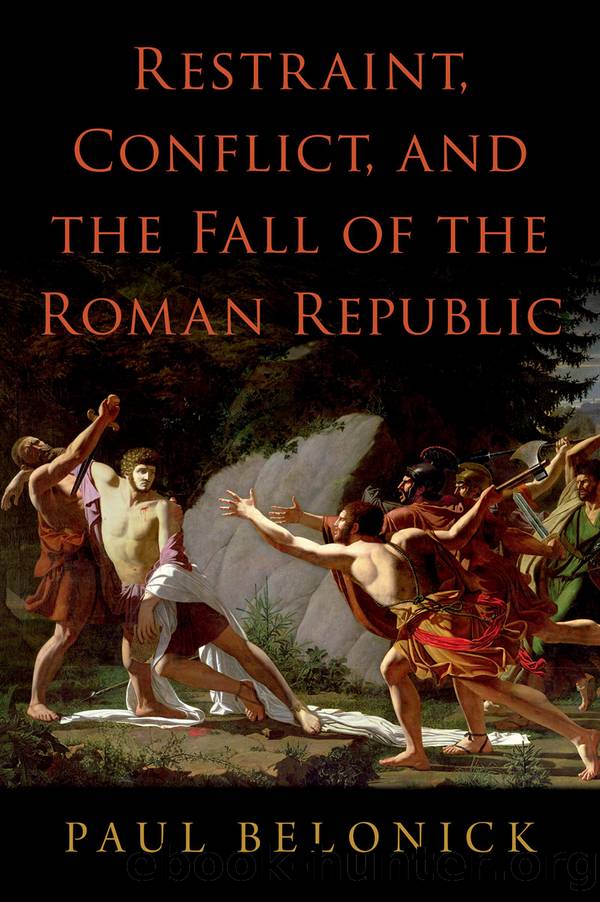Restraint, Conflict, and the Fall of the Roman Republic by Paul Belonick;

Author:Paul Belonick;
Language: eng
Format: epub
Publisher: Oxford University Press USA
Published: 2022-05-15T00:00:00+00:00
Similarly, Gaius Gracchus could say that âit is inescapable that a man who approves of dishonest men will disapprove of honest men,â and from that premise could conclude that those who killed his brotherâgreat nobles allâwere in fact pessimi. The trouble was that Gaiusâ enemies and Luciliusâ marks would have agreed with these all-purpose statements. The nub of debate was over who qualified as honestus, and in these decades answers were unpredictable. Everyone might believe in the abstract that a luxurious or libidinous man was malus. But Tiberius Gracchusâ episode revealed that a senator husbanding a fine estate was now a divisive character to a degree never seen before: intemperate and greedy (and thus no legitimate judge) to some, traditional and upright (and thus worthy of deference) to others.61
The last key after-effect was an important mental leap that sprang from this toggle-switch thinking. We have seen several men to this point in Roman history be unrestrained. Such obstinacy, however, had never been enough to merit death. Yet around the time of the Gracchi a new metaphor (if not yet the legal title, which would come) seems to have been applied for the first time to troublesome citizens: the concept of the hostis, an impudent foreign enemy against whom the use of ruthless force was second nature to the martial Romans.62 Scipio Nasica believed that Tiberius Gracchusâ unprecedented lack of restraint meant that he was actually trying to destroy the Republic. In 131 bc, Scipio Aemilianus judged Tiberius iure caesum (âjustly killedâ), and amplified the point in 129 when a mass of Gracchan supporters shouted for his death as a âtyrant,â to which Scipio casually replied, âThey want to kill meâjust what one would expect from the those who make war on the fatherland.â63 In toggle-switch thinking, normative disagreement was âwar,â and there was no middle groundâand thus no quarter.
A decade later the hostis metaphor recurred when one of Gaius Gracchusâ supporters killed one of the consul Opimiusâ attendants, and Opimius called on a senatorial mob and foreign archers to help put Gaiusâ followers down as though enemies of the state. Even those opposed to Opimius adopted the metaphor: some felt that Opimiusâ dedication of his temple to concordia too much resembled a victorious general arrogantly celebrating a triumph over foreign foes.64 According to many modern scholars, black-and-white exempla of legendary citizen-hostes such as Sp. Maelius, Sp. Cassius, and M. Manlius Capitolinus also gained currency around this time to help justify the brothersâ murders, and indeed at this juncture orators began to use such stories (with their simplistic messages) to justify violence against other malefactors.65 Certainly, if one truly believed that oneâs fellow senatorsâeven oneâs own relatives, in Scipioâs caseâwere on the same moral plane as alien hordes, then mutual deference was in rocky straits indeed.
In sum, in these uncertain decades all agreed that the restraint ideals were powerful, wished to be perceived as following them, and attached political success to them. The political verdict on a man continued to be evaluated in terms of self-control.
Download
This site does not store any files on its server. We only index and link to content provided by other sites. Please contact the content providers to delete copyright contents if any and email us, we'll remove relevant links or contents immediately.
Chaco's Northern Prodigies : Salmon, Aztec, and the Ascendancy of the Middle San Juan Region after AD 1100 by Paul F. Reed(341)
Law Enforcement Interpersonal Communication and Conflict Management by Brian Douglas Fitch(340)
Digital International Relations by Unknown(334)
Critical Perspectives on Human Security : Rethinking Emancipation and Power in International Relations by David Chandler; Nik Hynek(318)
Skilled interpersonal communication: Research, theory and practice, Fifth edition by Owen Hargie(317)
The Enduring Color Line in U.S. Athletics by Krystal Beamon Chris M. Messer(312)
Evidence-Based Policy Making in Labor Economics by Hamermesh Daniel S.;Nottmeyer Olga K.;Nottmeyer Olga;King Sarah;King Sarah;King Sarah;(287)
EPSO CAST Political affairs EU policies: How to succeed in the selection procedure by Franco Reverte José María(275)
Writing Public Policy - A Practical Guide to Communicating in the Policy Making Process by Catherine F. Smith(259)
Criminological Theory in Context by John Martyn Chamberlain(256)
Threshold Concepts in Women's and Gender Studies by Christie Launius Holly Hassel(253)
Tibeton Yoga Its Secret Doc by Evans-Wentz(252)
Positive Psychology and Spirituality in Counselling and Psychotherapy (Conflict, Ethics, and Spirituality, 12) by unknow(251)
Rothschild and Early Jewish Colonization in Palestine (Geographical Perspectives on the Human Past) by Ran Aaronsohn(250)
Social Problems, Social Issues, Social Science by James Wright(249)
Play in child development and psychotherapy: toward empirically supported practice by Sandra W. Russ(242)
Cognitive Development in Infancy and Childhood (Elements in Child Development) by Mary Gauvain(239)
Latin American Politics and Society by Gerardo L. Munck & Juan Pablo Luna(213)
What Makes a Social Crisis?: The Societalization of Social Problems by Jeffrey C. Alexander(211)
